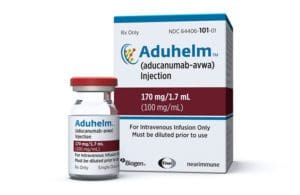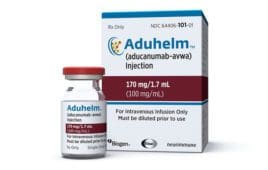 A recent physician survey found that 89% of neurologists in the U.S. have concerns about the efficacy of the controversial Alzheimer’s drug Aduhelm (aducanumab) from Biogen (Nasdaq:BIIB) and Eisai Co. (TYO:4523). Nearly as many — 87% — were concerned about the drug’s safety profile.
A recent physician survey found that 89% of neurologists in the U.S. have concerns about the efficacy of the controversial Alzheimer’s drug Aduhelm (aducanumab) from Biogen (Nasdaq:BIIB) and Eisai Co. (TYO:4523). Nearly as many — 87% — were concerned about the drug’s safety profile.
The survey from the physician social media network Sermo (New York City) asked more than 50 neurologists about their view of the drug, which has failed to find widespread use, generating just $3 million in 2021. Only 11% of the neurologists surveyed reported prescribing the drug.
Despite low uptake, many patients are aware of the drug. A total of 62% of the surveyed neurologists reported that at least one patient had asked them about Aduhelm.
“Despite lively and ongoing debate among academic research experts, limited attention has been paid to the views of practicing neurologists on biomarker-based accelerated approvals for Alzheimer’s disease,” said Dr. Murali Doraiswamy, professor of psychiatry and professor of medicine at Duke University School of Medicine, and an advisor to Sermo. “To my knowledge, this is the first survey to seek the opinions of neurologists and GPs on this topic.”
Although the survey sample was small, “the findings are quite compelling,” Doraiswamy added. “The vast majority of practicing GPs and neurologists remain unconvinced of the efficacy and safety of Aduhelm. Even the best innovation will fail if end users are not open to it.”
Aduhelm has faced an array of challenges since it was FDA-approved in June 2021. Recently, Medicare decided to limit Aduhelm’s coverage of the drug to clinical trial participants, and other payers, including the Department of Veteran Affairs, have also not warmed to it. Biogen scrapped an attempt to win market authorization for the drug in the EU while cutting the U.S. price of the drug in half in December. Early this month, the company’s CEO Michel Vounatsos announced he would leave the company, while the company’s former head of R&D, Dr. Alfred Sandrock, departed last year.
Aduhelm is unlikely to be the last targeting amyloid or tau in the brain of Alzheimer’s patients.
Earlier this month, Biogen partner Eisai completed its rolling FDA submission of a Biologics License Application (BLA) for anti-amyloid agent lecanemab (BAN2401), a potential antibody treatment for treating mild Alzheimer’s disease and mild cognitive impairment stemming from the condition.
Biogen also continues to recruit Alzheimer’s for its Phase 4 ICARE AD-US Aduhelm trial, which is investigating the safety and effectiveness of Aduhelm.
In any event, more data are likely needed to resolve neurologists’ concerns about Aduhlem and other similar future drugs. “Additional research and education should be a high priority for the field and companies developing similar drugs,” Doraiswamy concluded.
Filed Under: Neurological Disease





Tell Us What You Think!
You must be logged in to post a comment.